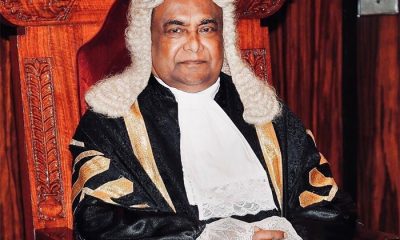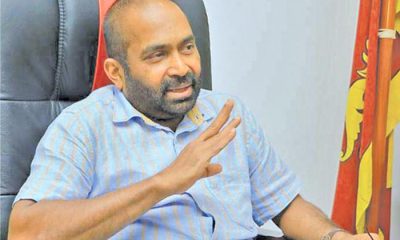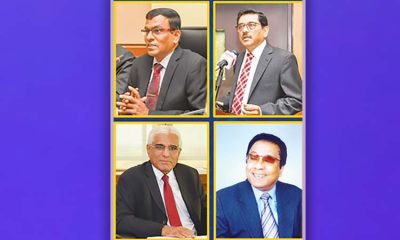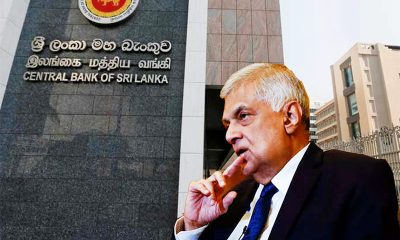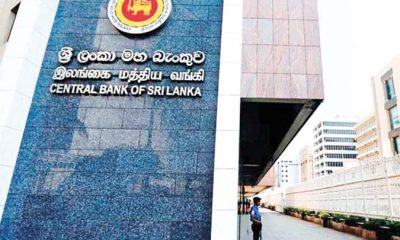News
MPs call for abolition of collective agreement
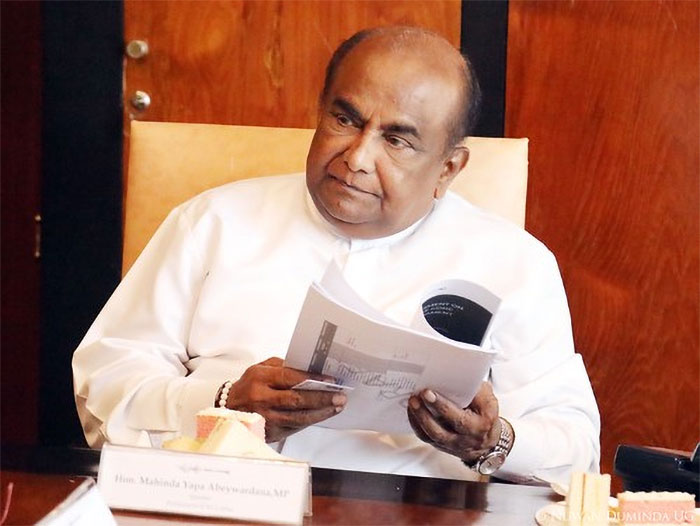
Central Bank pay hike controversy:
By Saman Indrajith
The MPs who met a group of officials from the Central Bank of Sri Lanka (CBSL) yesterday found that the controversial salary increments of the CBSL workers had been based on a collective agreement. Some of the MPs argued that the collective agreement should be abolished.
The meeting with CBSL officials was attended by over 50 MPs of both the government and Opposition and commenced around 11.30 am at the Committee Room 2 and continued till 1.30 pm.
The CBSL officials made a presentation and the room was open for MPs to raise questions. They first met the party leaders and then the Committee of Public Finance members and MPs. The second meeting was also attended by officials of the Attorney General’s Department. The Speaker presided over the first meeting.
Chief Opposition Whip Kandy District SJB MP Lakshman Kiriella said. “I asked them to point out the legal provision for what they did and name a section or an Act of Parliament giving powers to them to decide their own salaries. They could not cite such provision,” Kiriella said.
The CBSL salary increments amount to around Rs 232 million a month. “I was the one who first raised this issue in the House. This morning, too, I demanded to know from the government what the standpoint of the Cabinet is because the summoning of CBSL officials to Parliament had been discussed at Monday’s Cabinet meeting.
The Cabinet ministers, too, have expressed their displeasure. At the meeting with CBSL officials, four government MPs spoke, and none of them approved of what the CBSL officials have done,” Kiriella said.
CBSL Governor Dr. Nandalal Weerasinghe stated that there were provisions in Sections 5, 8 and 23 of the CBSL Act for the slaries of the CBSL officials to be increased.
Kiriella pointed out those sections expressly made provisions for the expenses of the CBSL but not about salary increases. Section 23 stated about determining the amount of salaries provided that it is approved finally by Parliament.
SLPP dissident MP Gevindu Cumaratunga pointed out that the problem had been created by the government by passing a Bill to make the CBSL independent, but neither the Prime Minister, leader of the House, Chief Government Whip, nor the Finance Minister or State Finance ministers were present at this meeting. “We opposed this Bill and voted against this. Now those who created this mess are not present to question the CBSL officials,” Cumaratunga said.
Kiriella said that the government looked the other way when CBSL officials got their salaries increased. The government did not increase the salaries of professors, doctors, university teachers and other professionals, but kept silent when the CBSL officials got it done for themselves. The government must give answers. One of the CBSL secretaries told me that with the recent increment, she draws a monthly salary equal to ten times of the monthly salary of a ministry secretary. They collected money from tins and distributed it among themselves by barrels, he said.
Cumaratunga pointed out that the money handled by the CBSL officials were public funds therefore they are responsible to Parliament which has supremacy over the matters pertaining to the use of public funds.
TNA MP Sumanthiran, too, expressed the same view. He said that the CBSL did not earn money but uses the public money.
The CBSL officials responded that the salary increment was done as per the provisions of a collective agreement.
Gamapaha District MP Lasantha Alagiyawanna demanded to know from the CBSL officials whether that collective agreement was registered with the Labour Department.
MP Dayasiri Jayasekera said that a collective agreement to be valid should be registered with the Labour Department and became valid only after the Labour Commissioner gazettes it.
The collective agreement in question was neither registered nor gazetted, as such it is not a valid collective agreement, Jayasekera said.
As per Articles 148 and 149 (2) of the Constitution, Parliament had the powers over the use of public funds, he said, adding that the CBSL, too, was coming under that purview despite that there are wrong interpretations of the CBSL Act passed recently to give independence to the Central Bank. It is stated in that Act that money remaining in the Central Bank should be directed to the Consolidated Fund, and that meant the CBSL, too, come under the institutions responsible to Parliament.
Jayasekera said that the operations of collective agreements could be suspended. The operations of collective agreements in the CEB, CPC, and Harbour have been suspended.
News
Power sector overhaul targets losses, debt and tariffs
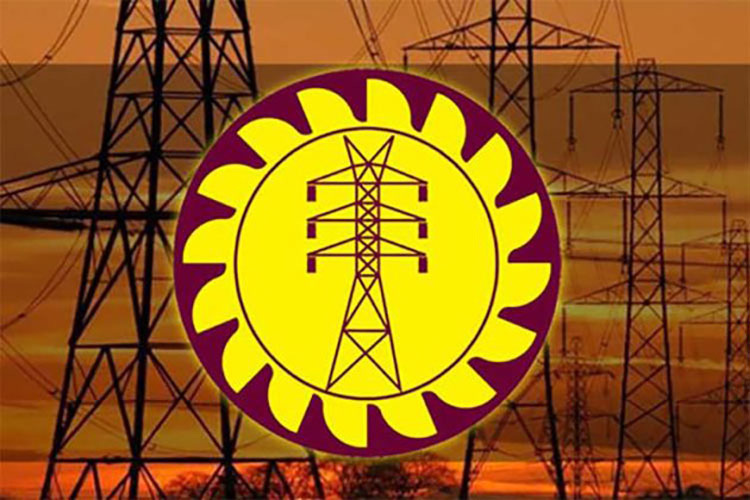
Independent trade unions cry foul
The government has launched a far-reaching overhaul of the electricity industry, breaking up the Ceylon Electricity Board (CEB) into six fully state-owned companies, claiming to rein in chronic losses and mounting debt.
Under the Preliminary Transfer Plan, the newly incorporated entities, namely, Electricity Generation Lanka (Pvt) Ltd (EGL), National Transmission Network Service Provider (Pvt) Ltd (NTNSP), National System Operator (Pvt) Ltd (NSO), Electricity Distribution Lanka (Pvt) Ltd (EDL), CEB Employees Funds (Pvt) Ltd (CEBEF) and Energy Ventures Lanka (Pvt) Ltd (EVL), will take over the assets, liabilities and operations of the CEB from the appointed date.
Independent trade unions have opposed the restructuring programme.
At the core of the new model is the creation of an independent National System Operator, which will handle power system planning and competitively procure electricity from Electricity Generation Lanka, Independent Power Producers and non-conventional renewable energy developers. Power will be wheeled through the national grid operated by the NTNSP and sold to distribution companies.
Explaining the economic rationale, Eng. Pubudu Niroshan Hedigallage said the separation of functions was critical to restoring cost discipline in the sector.
“Electricity planning and procurement will now be carried out independently, based on least-cost principles. That is essential if we are to control generation costs and ease the upward pressure on tariffs,” he said.
Electricity Generation Lanka, though a successor to the CEB, will compete with private and renewable energy producers for projects, a move expected to curb inefficiencies and end guaranteed returns enjoyed under earlier arrangements.
“There will be no automatic allocation of projects. EGL must compete in the market like any other generator,” Eng. Hedigallage said.
According to officials, the Preliminary Transfer Plan provides for one generation and one distribution company initially, with further unbundling planned under the Final Transfer Plan to introduce sharper financial accountability at operational level.
Economists note that the restructuring is closely watched by multilateral lenders and investors, who have repeatedly flagged the power sector as a major fiscal risk.
The government has insisted that the reforms do not amount to privatisation, stressing that all six entities remain 100 percent state-owned. However, independent trade unions are of the view that what the government has undertaken is divestiture in all but name.
By Ifham Nizam
News
India, Sri Lanka speakers discuss technology-driven parliamentary innovation, including AI-enabled systems
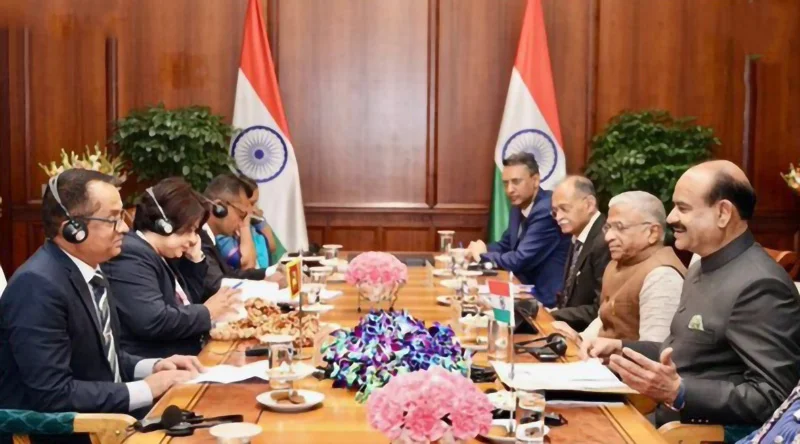
Speaker of Lok Sabha Om Birla and Sri Lankan Speaker (Dr.) Jagath Wickramaratne recently discussed the possibility of expanding parliamentary cooperation through regular exchanges, formation of friendship groups, collaboration in policy and programme design and deeper engagement in technology-driven parliamentary innovation, including AI-enabled systems, real-time multilingual translation, and capacity building through Parliamentary Research and Training Institute for Democracies (PRIDE).
The discussion took place on the sidelines of the 28th Conference of Speakers and Presiding Officers of the Commonwealth (CSPOC) held in New Delhi recently.
The following is the text of the statement issued by the Indian High Commission in Colombo: ” Speaker of the Parliament of Sri Lanka (Dr.) Jagath Wickramaratne concluded his visit to India from 14-18 January 2026, for participation in the 28th Conference of Speakers and Presiding Officers of the Commonwealth (CSPOC) held in New Delhi. This was his first visit to India after assuming office. He was accompanied by Secretary-General of Parliament Kushani Rohanadeera and Assistant Director, (Administration) of the Parliament of Sri Lanka Kanchana Ruchitha Herath. Following the 28th CSPOC from 14-16 January 2026, Speaker and his delegation visited Jaipur, Rajasthan as a part of a two-day tour for CSPOC delegates from 17-18 January 2026.
The 28th CSPOC was inaugurated by Prime Minister of India Narendra Modi on 15 January 2026 at the Central Hall of Samvidhan Sadan, Parliament House Complex, New Delhi. Welcoming parliamentary leaders from across the Commonwealth, Prime Minister Modi highlighted the success of Indian democracy in providing stability, speed, and scale. He shared India’s efforts at giving voice to the Global South and forging new paths of cooperation to co-develop innovation ecosystems. He underlined the use of Artificial Intelligence by the Parliament of India to attract youth to understand Parliament. Prime Minister expressed his confidence in the CSPOC platform for exploring ways to promote knowledge and understanding of parliamentary democracy.
The conference, chaired by Lok Sabha Speaker Om Birla, convened 44 Speakers and 15 Deputy Speakers from 41 Commonwealth countries, along with representatives of four semi-autonomous Parliaments. The theme of the conference was “Effective Delivery of Parliamentary Democracy.” During the conference, participants addressed the role of Speakers in reinforcing democratic institutions, the integration of artificial intelligence in Parliamentary functions, the influence of social media on Members, approaches to enhance public engagement with Parliament, and measures to ensure the security, health, and wellbeing of Members and Parliamentary staff.
The visit marked a significant milestone in the evolving parliamentary partnership between India and Sri Lanka. Last year, two Parliamentary Delegations visited India for Orientation Programmes in May 2025 and August 2025 respectively. These visits, in line with the intent of the India – Sri Lanka Joint Statement on ‘Fostering Partnerships for a Shared Future’, further reinforce the strong democratic ethos and enduring friendship shared between the two nations.”
News
Pakistan HC celebrates academic achievements of Lankan graduates
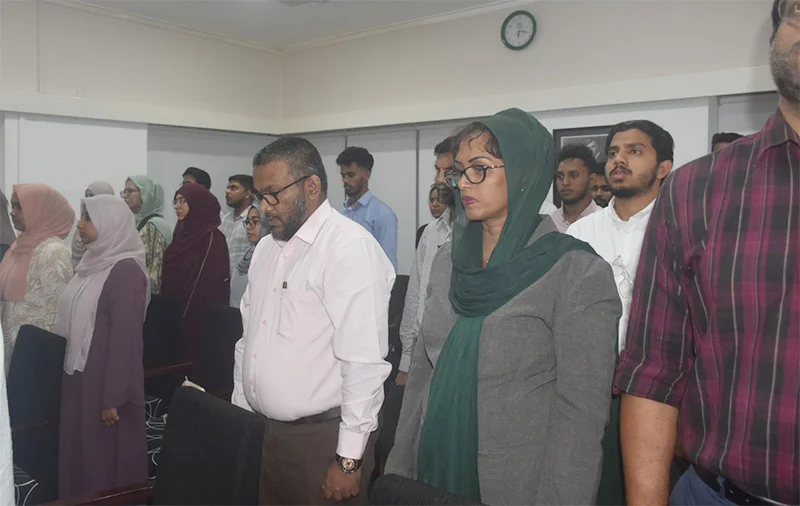
The High Commissioner of Pakistan in Sri Lanka hosted a special reception on Friday (16) for Sri Lankan alumni who have recently returned from their studies in Pakistan. The event, held at the Pakistan High Commission, celebrated the academic achievements of the graduates and reinforced the deep-rooted educational ties between the two nations.
The Allama Iqbal Scholarship Programme, a flagship initiative launched in 2019, has become a vital pillar of bilateral cooperation. The High Commissioner highlighted that Pakistan offers 1,000 fully funded scholarships at graduate, postgraduate, and PhD levels, with over 500 Sri Lankan students currently pursuing their education in Pakistan’s premier universities.
“Sri Lanka and Pakistan share an enduring friendship rooted in a shared history of mutual respect and culture,” the High Commissioner remarked during the address. “Education is the key to unlocking the success of your brilliant futures and creating bonds that extend well beyond the classroom”.
Addressing the alumni as “custodians” of a noble cause, the High Commissioner urged the alumni to act as brand ambassadors by sharing their knowledge to guide deserving students toward academic opportunities in Pakistan.
He emphasised their responsibility to mentor young minds, ensuring no capable student misses the chance for a promising future. Furthermore, the alumni were encouraged to take an active role in organising frequent educational and cultural engagements to inspire and enlighten others while strengthening the ties between the two nations.
The High Commissioner emphasized that each graduate serves as a “bridge” between the two countries, playing a meaningful role in uplifting Sri Lanka while further strengthening Pakistan–Sri Lanka relations. The alumni were invited to remain closely connected with the High Commission to facilitate future initiatives that strengthen people-to-people ties.
The evening concluded with a traditional Pakistani dinner, where the alumni shared stories of their academic growth and cultural experiences in Pakistan in a spirit of friendship and togetherness.
-

 Editorial3 days ago
Editorial3 days agoIllusory rule of law
-

 News4 days ago
News4 days agoUNDP’s assessment confirms widespread economic fallout from Cyclone Ditwah
-

 Business6 days ago
Business6 days agoKoaloo.Fi and Stredge forge strategic partnership to offer businesses sustainable supply chain solutions
-

 Editorial4 days ago
Editorial4 days agoCrime and cops
-

 Features3 days ago
Features3 days agoDaydreams on a winter’s day
-

 Editorial5 days ago
Editorial5 days agoThe Chakka Clash
-

 Features3 days ago
Features3 days agoSurprise move of both the Minister and myself from Agriculture to Education
-

 Features2 days ago
Features2 days agoExtended mind thesis:A Buddhist perspective


